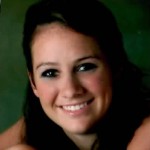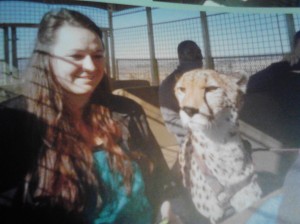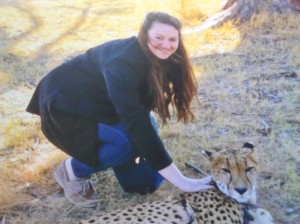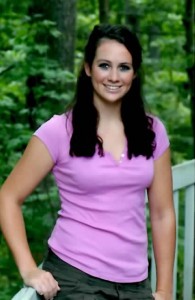Dance Like No One’s Watching
Abbie Jane Harper went in search of her own answers … and found them
By Stefan Cooper
Editor
Blount Press Row
She’d seen many things she found disturbing.
Most unsettling to Abbie Jane Harper was a question she put to herself:
When she got home, when she returned to school, would she still care?
“But then I’ll walk away,” Abbie wrote in a journal titled ‘South African Summer.’ “I’ll walk away from the emotions I felt, the knowledge gained, the temporary empathy that overtook me for that hour and a half. I’ll walk away, and I’ll go back to my real life.
“A life focused on what souvenir I’m going to deliver to my sisters and whether I can fit a new pair of boots into my suitcase for the plane ride home. No one admits this, but it’s the reality. It is a rare few who go into the Apartheid Museum and come out forever changed.
“Many will claim they have been, but almost all will soon get back to their routine, and the inner turmoil and inspiration to make a difference in the world erodes a bit more with each bill that shows up on their doorstep and each meal that must be cooked.
“It’s human nature, and it’s virtually impossible to overcome.”
When she returned to The University of Chicago Law School last August, Abbie did not forget. The focus of her legal career, she informed her parents, Kenny and Leyanne Harper, would be international law and human rights.
Three months later, we lost her.
Diagnosed with Type 1 or juvenile diabetes her senior year at Maryville High School in 2007, Abbie died in her Chicago apartment on Nov. 14, 2013 after slipping into diabetic ketoacidosis. She was 23.
Leyanne and Kenny Harper established the Abbie Jane Harper Memorial Scholarship at Maryville within weeks of her passing. The East Tennessee Foundation administers the scholarship and the Harpers ask you visit the foundation’s web site to learn more.
We ask, through her words, you spend a few minutes to get to know Abbie.
A softball second baseman, volleyball setter and basketball shooting guard, Abbie lettered in three sports each of her four seasons at Maryville. She had an infectious laugh away from the courts and playing fields, which is how a certain sportswriter became so fond of her. Her freshman season in softball, she got the game-winning hit at sectioinals to send the Lady Rebels to state.
Abbie majored in journalism at Miami University in Oxford, Ohio. In retrospect, that’s not surprising. “South African Summer,” from which much of what you will read is drawn, is filled with photographs, but Abbie’s words, interspersed, are the camera lens.
Want to know what it’s like to skydive, to share a seat on a truck with a cheetah, to pet one!
Tour guide: “Do not move suddenly; do not make loud or high-pitched noises.”
Abbie: “Wait, she’s serious?”
Guide: “Most importantly, absolutely do not make eye contact.”
Abbie: “So this thing can ride on the truck with us, but we can’t make eye contact? Are you sure you know what you’re doing?”
After a short ride, “Felix,” as Abbie dubs her new seatmate, raises the stakes:
Guide: “You can pet him, too. Just don’t get too close to his face, and pet firmly so he doesn’t think it’s someone trying to sneak up on him.”
Abbie: “Are you sure I can be doing this?
“Should I stop?
“He’s looking at me.
“Shoot.
“What do I do?
“What does that noise he’s making mean?
“Is he mad?”
Evidenced by her athletic career at Maryville, Abbie was also a competitor.
“In a conversation she’d compete,” Leyanne said.
When she set her mind to the right or wrong of something, Abbie could be relentless in arguing her point.
“That was part of her reason for going into law,” Kenny said. “She loved to argue; she loved to debate.”
Abbie was in her second year at the University of Chicago Law School at the time of her death. Some details on the school are pertinent here.
U.S. News & World Report ranks Yale, Harvard and Stanford (tied for second) and Columbia and the University of Chicago (tied for fourth) as the nation’s top five law schools. Tuition at each exceeds $50,000 per year for a full-time student.
University of Chicago Law School students have a 91 percent success rate of finding a job after graduation, with average starting salary for those entering the private sector at $160,000 per year, $47,657 for those entering public service.
In its library, the law school at University of Chicago – not the university at large, just the law school — has 681,000 books.
With that kind of wind in her sails, Abbie began plotting a course for her life last summer few others would. The events that set it in motion took place less than a year prior to her arrival in Johannesburg.
On Aug. 16, 2012, striking miners at the Lonmin platinum mine in the northern township of Marikana were met by police and cut down in a hailstorm of machine gun bullets. Dubbed the “Marikana massacre,” the shooting left 34 dead and at least 78 others injured.
When local prosecutors moved to charge 270 of the survivors with the murder of their fellow miners, citing the Apartheid-era doctrine of “common purpose,” the South African government got involved, establishing the Marikana Commission of Inquiry.
The non-profit Centre for Applied Legal Studies began handling much of the investigative work for the families of the victims. Abbie joined CALS as part of a law school internship the summer of 2013, only this would be no internship:
“I ended up spending the majority of my time in South Africa working under my mentor Kathleen Hardy on the Marikana Commission,” Abbie writes. “My first big task was to go through around 200 police statements and record how many shots each policeman said he fired, and compare that to how many he actually fired (each policeman has to enter the number of bullets he starts the day with and the number he ends with, which allows forensics to determine how many shots were actually fired by each policeman).
“I was able to show that the numbers given by police in their statements were more often than not incorrect, often blatantly so.”
Those troubling discoveries were only the start.
Abbie continues: “I then started on a project where I was going through the (approximately 400) statements of both the shooters and the non-shooters on the police service and pulling out excerpts that demonstrated unlawful or unnecessary shooting by police, collusion or cover-up, inadequate briefing or training by the commanding officers, or any other inappropriate actions on the part of the police service.”
Mind you, this is a 23-year-old kid from the South who attends one of the finest law schools in America. Abbie didn’t have to care. Had she informed her co-workers at CALS she wanted no part of this, it would have been hard to find fault.
This wasn’t a law school exercise. This was life at close range.
Abbie went ahead.
At the end of her research, Abbie compiled a lengthy legal document of her findings.
“That document,” she writes, “was actually submitted to the Commission soon after I left South Africa.”
It would be inaccurate to say Abbie’s work with CALS spurred her to further investigate the history of South Africa. Even as a child, Abbie questioned, Leyanne said. To learn as much as she could about South Africa, Abbie didn’t rely solely on books and museums. She got out and saw the country for herself. She talked to people, people in the hotel where she stayed, taxi drivers.
One night, Abbie went dancing and soon found herself “the only white person in sight.”
Abbie’s recollections of that night tell best the story of an honest, rare soul who never stopped looking for her own answers:
“Kea had been urging me to get up and dance with him for a while, so when ‘Single Ladies’ by Beyonce came on, I decided to make my move.
“I cautiously made my way to the circle and started swaying back and forth, and when the guy to my left noticed me, he excitedly nudged me into the middle. That’s right, the middle …
“Well, you can’t just sway in the middle of the circle, and experience has taught me that it’s better to embarrass yourself by overdoing it than underdoing it. So I ignored my audience and went into full dance-like-no-one’s-watching mode. When I did that, my audience went crazy; they clapped and cheered and jumped up and down.
“The cheering excited me, so much so that I went into full Beyonce mode …
“That was my only solo performance of the night, but I did dance some more, and I couldn’t help but feel like the girl from “Save the Last Dance” as Kea futilely tried to teach me rhythm. Not sure I ever got it, but I did have a good time.”
Arguably the toughest thing about Abbie’s passing is Kenny and Leyanne never had the option to simply stop and hurt for a while. Abbie has three sisters. They had no choice but to keep going as best they could.
It’s made for some awkward encounters with friends, both said. For fear of saying the wrong thing, some have taken to avoiding them. Don’t, they say. There’s no easy way through this. Come on up. They’ll be OK.
For the toughest times, Leyanne said they rely on their faith. The Harpers are members of the First Baptist Church of Maryville and held a celebration of Abbie’s life – not a funeral – there.
“We didn’t put on a service,” Kenny said. “We just told Abbie’s story.”
The outpouring of concern they’ve received has been heartfelt and reaffirming, he said.
“Almost every letter has mentioned Abbie’s faith,” Kenny said, “and that’s been comforting to us. It made us proud that she wasn’t shy about it.”
It’s the spirit Abbie possessed to question, to challenge, that led them to endow the scholarship, Kenny and Leyanne said. Abbie returned from South Africa 10-feet tall and full of purpose. Someone, in some fashion, must follow her work.
The recipient doesn’t have to go into law or journalism or anything of the sort, Leyanne said. All they ask, she said, is make the most of your time.
“You want to get that before you leave high school,” Leyanne said. “You don’t have a lot of time. You need to do something big with your time, and that’s helping other people.”
And every now and then, in the middle of a crowded room, when you’re scared senseless, dance like no one’s watching.
About Stefan Cooper
Stefan Cooper is an award-winning sports journalist in Blount County, TN. Stefan has been writing about local sports for more than 25 years. In fact, he's writing stories today about the kids of players he used to write stories about. You'll spot him biking around town, hanging out at a coffee shop or Southland Books, or in his natural habitat: the sideline of the game.






You must be logged in to post a comment Login